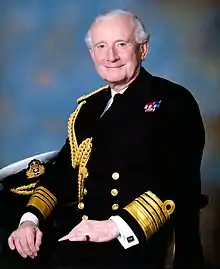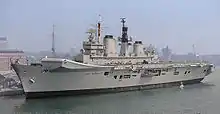Jock Slater
Admiral Sir John Cunningham Kirkwood "Jock" Slater, GCB, LVO, DL (born 27 March 1938) is a retired Royal Navy officer. He commanded a minesweeper, a frigate and then a destroyer before taking over the aircraft carrier HMS Illustrious and then achieving higher command in the Navy. He served as First Sea Lord and Chief of the Naval Staff from 1995 to 1998: in that capacity he played a key role in the 1998 Strategic Defence Review carried out by the Labour Government that had come to power a year earlier.
Sir Jock Slater | |
|---|---|
 Admiral Sir Jock Slater | |
| Nickname(s) | Jock |
| Born | 27 March 1938 |
| Allegiance | United Kingdom |
| Service/ | Royal Navy |
| Years of service | 1958–1998 |
| Rank | Admiral |
| Commands held | First Sea Lord Vice-Chief of the Defence Staff Commander-in-Chief Fleet Flag Officer Scotland and Northern Ireland HMS Dryad HMS Illustrious HMS Kent HMS Jupiter HMS Soberton |
| Battles/wars | Falklands War |
| Awards | Knight Grand Cross of the Order of the Bath Lieutenant of the Royal Victorian Order Legion of Merit (United States) |
Early life
Slater was the son of James Kirkwood Slater and Margaret Claire Byrom Bramwell, daughter of Dr Edwin Bramwell.[1]
Slater was educated in his early years at the Edinburgh Academy before attending Sedbergh School and the Royal Naval College, Dartmouth.[1] Slater is a great nephew of Admiral of the Fleet The Viscount Cunningham of Hyndhope who served as First Sea Lord during the Second World War.[2]
Naval career
Slater joined the Royal Navy as a cadet in 1956 and was confirmed in the rank of sub lieutenant on 1 January 1959.[3] During his early career he served in the destroyer HMS Troubridge, the minesweeper HMS Yaxham, the Royal Yacht HMY Britannia and the destroyer HMS Cassandra.[1] In 1965 he was given command of the minesweeper HMS Soberton, which he commanded on fishery protection duties,[4] before specialising in navigation.[1] He was posted to the shore establishment HMS Dryad later that year and then served in the aircraft carrier HMS Victorious and then the frigate HMS Scarborough over the next two years.[1]
Slater became an Equerry to the Queen on 12 October 1968[5] and, having been promoted to lieutenant commander on 22 October 1968,[6] his services were recognised when he was made a Lieutenant of the Royal Victorian Order on 15 October 1971.[7] Following promotion to commander on 31 December 1971,[8] he was given command of the frigate HMS Jupiter in 1972.[1] He was posted to the Directorate of Naval Operations at the Ministry of Defence in 1973 and, following promotion to captain on 30 June 1976,[9] he was given command of the destroyer HMS Kent in August of that year.[1] He attended the Royal College of Defence Studies in 1978 and then became assistant director of Naval Warfare at the Ministry of Defence in 1979.[1] He went on to become the first commanding officer of the aircraft carrier HMS Illustrious in May 1981 and then became Captain at the School of Maritime Operations and Commander of HMS Dryad in July 1983.[1]

Slater was promoted to rear admiral on 18 June 1985,[10] on appointment as Assistant Chief of the Defence Staff (Policy and Nuclear), and then promoted to vice admiral on 20 October 1987,[11] on appointment as Flag Officer Scotland and Northern Ireland as well as NATO Commander Northern Sub-Area Eastern Atlantic, NATO Commander Nore Sub-Area Channel and Commander HM Naval Base Rosyth.[1] Appointed a Knight Commander of the Order of the Bath in the 1988 Birthday Honours,[12] he went on to be Chief of Fleet Support in March 1989.[1] He was promoted to full admiral on appointment as Commander-in-Chief Fleet as well as NATO Commander-in-Chief, Channel and Commander-in-Chief, Eastern Atlantic in January 1991.[1] Advanced to Knight Grand Cross of the Order of the Bath in the 1992 Birthday Honours,[13] he became Vice-Chief of the Defence Staff in January 1993.[1]
Slater was appointed First Sea Lord and Chief of the Naval Staff in July 1995.[1] In that capacity he played a key role in the Strategic Defence Review carried out by the incoming Labour Government.[14] He retired in December 1998.[15]
Later career
In retirement Slater has served as a Non-Executive Director of VT Group and of Lockheed Martin UK.[1] He has also been Chairman of the executive committee of the Royal National Lifeboat Institution, Chairman of the Royal Navy Club of 1765 & 1785, Chairman of the Trustees of the Imperial War Museum and Chairman of the Council of Management of the White Ensign Association.[1] He has been a Deputy Lieutenant of Hampshire,[16] an Elder Brother of Trinity House, a Prime Warden of the Shipwrights' Company, and a Freeman of the City of London.[1] His other interests mostly include outdoor activities.[1]
Family
In 1972 Slater married Ann Frances, daughter of William Scott OBE DL, by whom he has two sons (Charles and Rory).[1]
References
- Who's Who 2010, A & C Black, 2010, ISBN 978-1-408-11414-8
- "History and Development". Naval Records Society. Archived from the original on 7 September 2012. Retrieved 19 August 2012.
- "No. 42159". The London Gazette. 4 October 1960. p. 6703.
- "Sir Jock Slater". Bloomberg BusinessWeek. Retrieved 19 August 2012.
- "No. 44790". The London Gazette. 14 February 1969. p. 1705.
- "No. 44699". The London Gazette (Supplement). 18 October 1968. p. 11321.
- "No. 45499". The London Gazette. 19 October 1971. p. 11269.
- "No. 45575". The London Gazette (Supplement). 18 January 1972. p. 645.
- "No. 46953". The London Gazette (Supplement). 5 July 1976. p. 9281.
- "No. 50148". The London Gazette. 10 June 1985. p. 8027.
- "No. 51086". The London Gazette (Supplement). 12 October 1987. p. 12655.
- "No. 51365". The London Gazette (Supplement). 10 June 1988. p. 2.
- "No. 52952". The London Gazette (Supplement). 12 June 1992. p. 2.
- "Former navy chief in government cuts warning". BBC News. 6 July 2010. Retrieved 19 August 2012.
- "No. 55340". The London Gazette (Supplement). 14 December 1998. p. 13619.
- "The Vice Lord-Lieutenant and Deputy Lieutenants". Hampshire County Council. Archived from the original on 8 September 2012. Retrieved 19 August 2012.